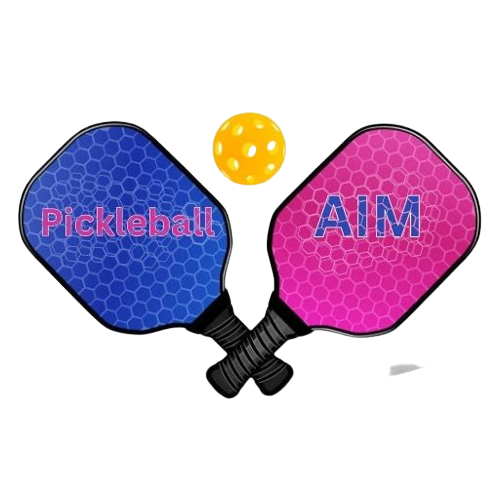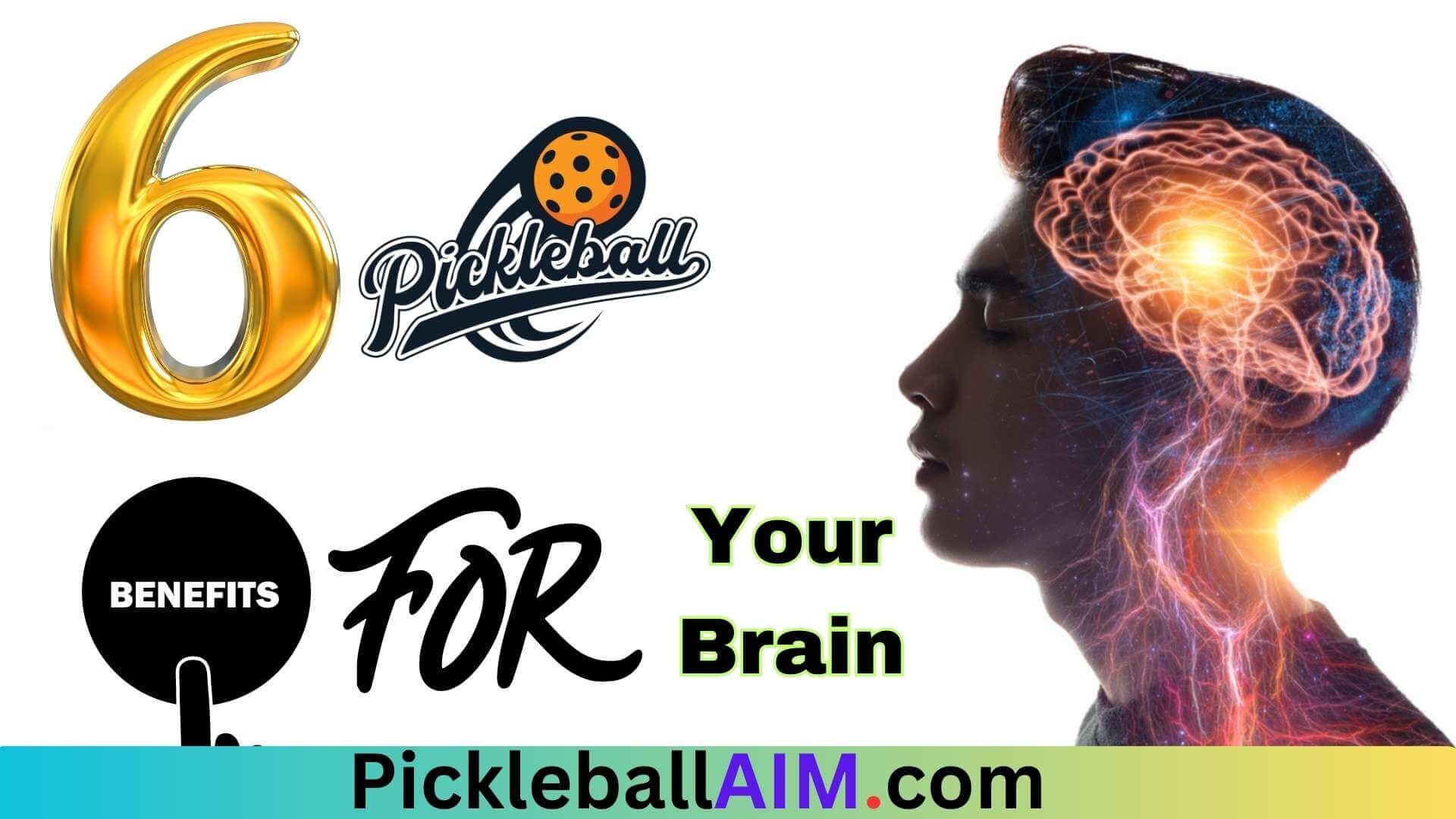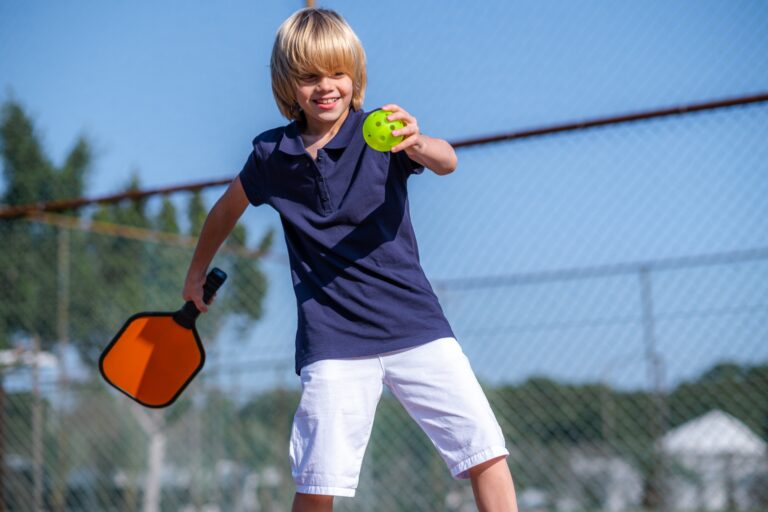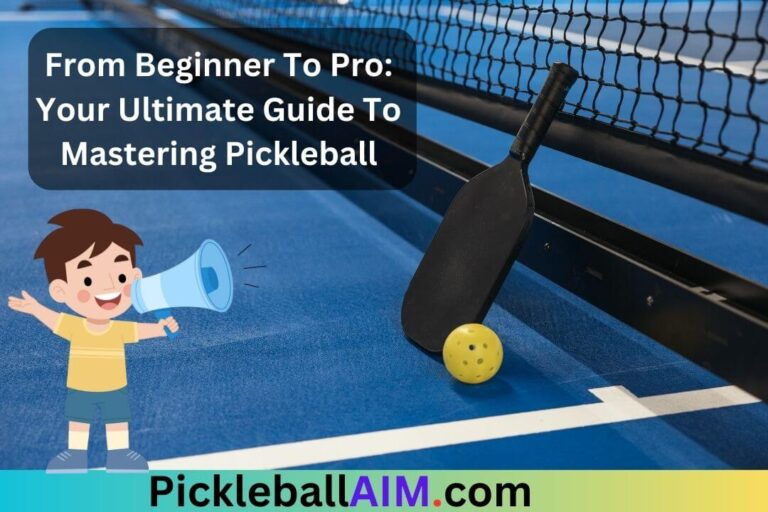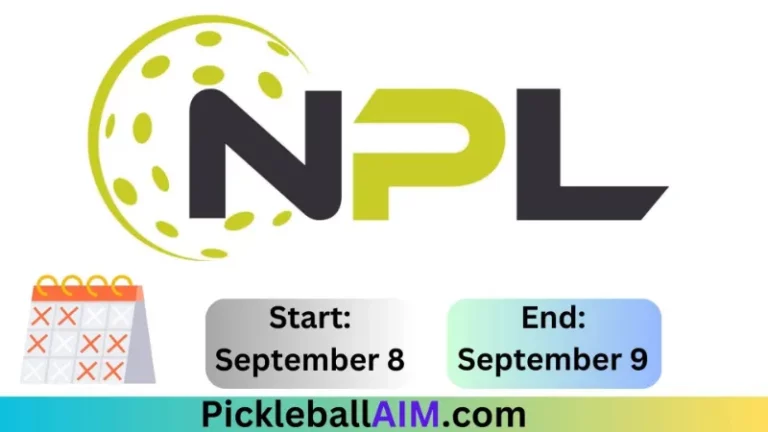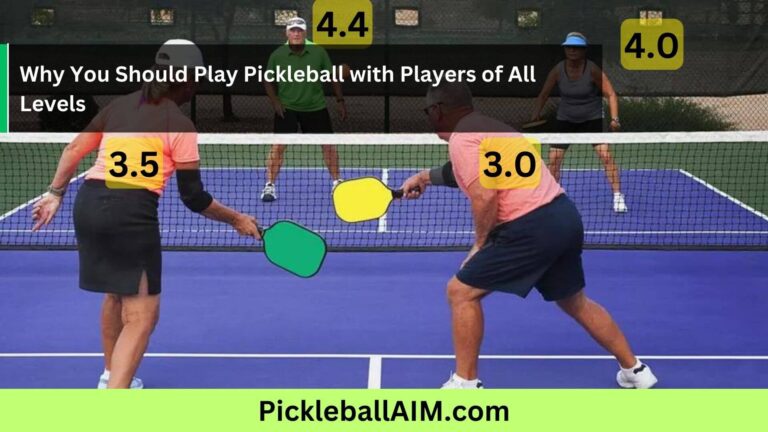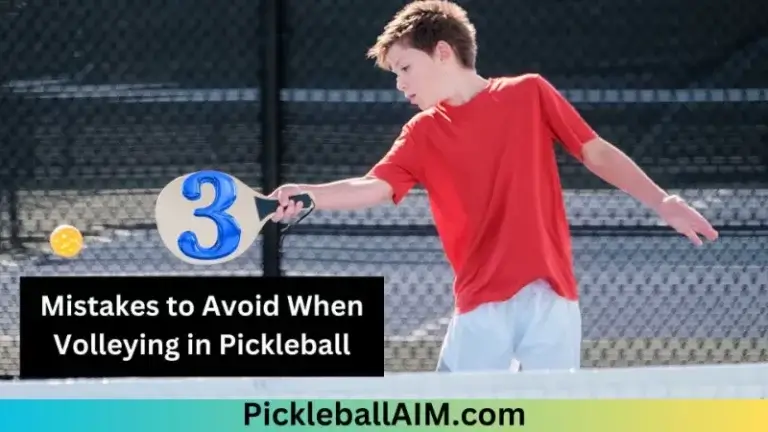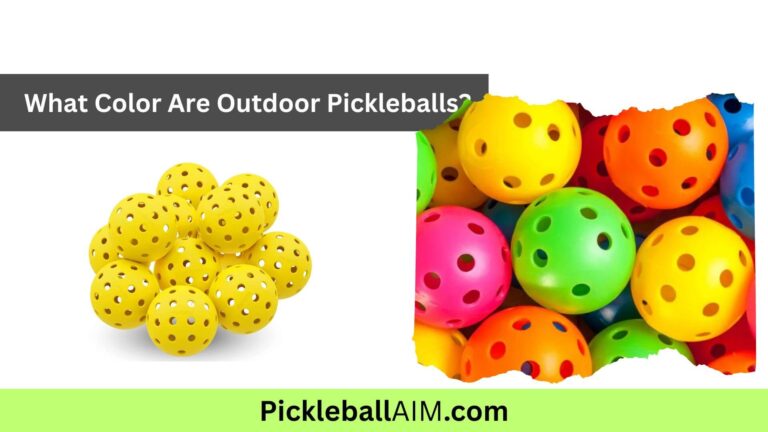Boost Your Brain: 6 Benefits of Pickleball for Cognitive Function
Introduction
Physical exercise has long been associated with numerous health benefits, from improving cardiovascular health to boosting mood and reducing stress. But did you know that engaging in certain sports, like pickleball, can also have a significant impact on cognitive function? Pickleball, a paddle sport that combines elements of tennis, badminton, and table tennis, not only provides a fun and social way to stay active but can also give your brain a powerful workout. In this article, we will explore six benefits of pickleball for cognitive function and why it’s a fantastic sport to boost your brainpower.
1. Enhanced Neuroplasticity
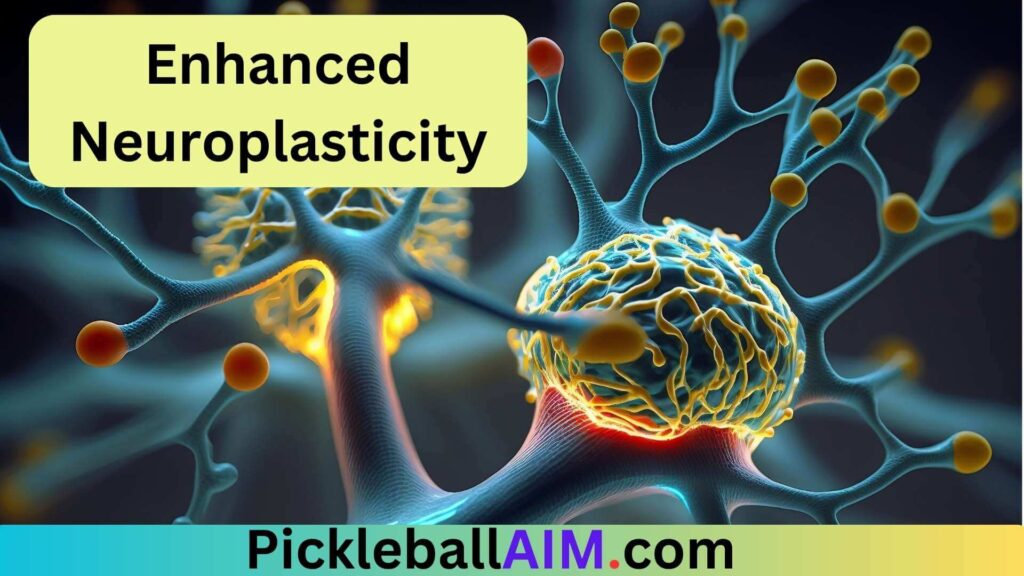
Neuroplasticity: The Brain’s Marvelous Ability
Neuroplasticity1[It is defined as the ability of the nervous system to change its activity in response to intrinsic or extrinsic stimuli by reorganizing its structure, functions, or connections after injuries, such as a stroke or traumatic brain injury (TBI).], often referred to as the brain’s plasticity, is a remarkable characteristic of our brain. It allows the brain to adapt, reorganize, and form new neural connections in response to experiences, learning, and environmental changes. This capacity plays a crucial role in our ability to learn, memorize information, and maintain overall brain health.
Pickleball: A Mental Workout for Neuroplasticity
When you step onto the pickleball court, you’re not just engaging in physical activity; you’re giving your brain a real workout. The dynamic nature of the game, involving various movements, strategies, and rapid decision-making, creates a fertile ground for enhancing neuroplasticity. As you learn and adapt to different shots, strategies, and playing styles of opponents, your brain undergoes structural changes to accommodate the new information.
Forging New Connections and Boosting Flexibility
The brain’s remarkable adaptability leads to the formation of new neural connections and the strengthening of existing ones. These connections facilitate cognitive flexibility, which is the ability to shift between different tasks, thoughts, and mental frameworks effortlessly. Pickleball’s ever-changing nature sharpens your cognitive flexibility, making you a more agile thinker both on and off the court.
2. Improved Memory
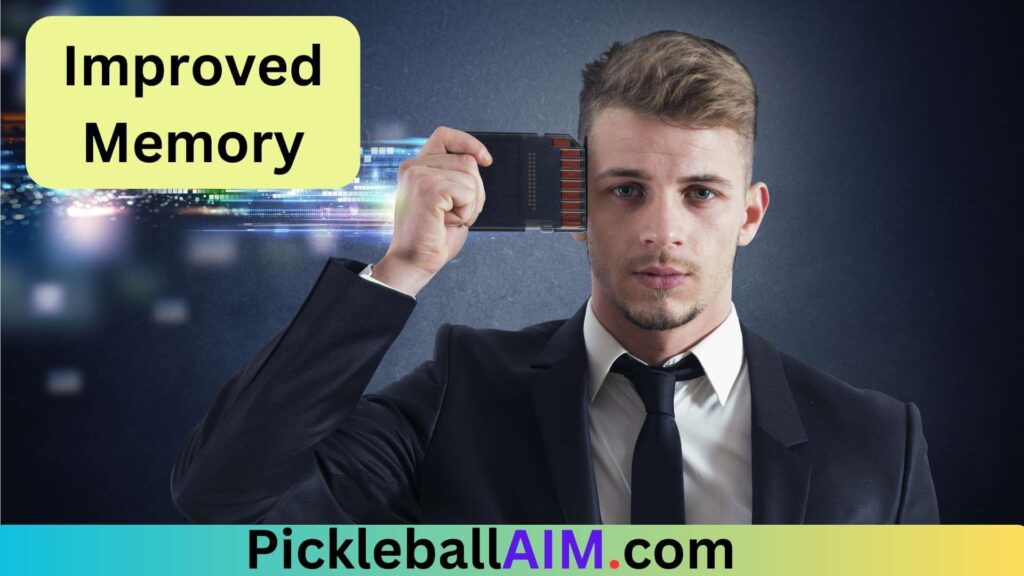
Pickleball: A Memory-Boosting Sport
Memory is an essential cognitive function that underpins our ability to learn, retain information, and recall experiences. Playing pickleball challenges and improves both short-term and long-term memory functions, keeping your mind sharp and receptive.
Remembering Your Opponent’s Style
In pickleball, being observant of your opponent’s playing style is key to gaining an advantage. As you engage in matches and encounters with different players, your brain is continuously processing and storing information about their strategies, strengths, and weaknesses. This exercise in memory helps you make informed decisions during future games, improving your chances of outsmarting opponents.
Recall and Quick Decision-Making
The fast-paced nature of pickleball necessitates split-second decisions during rallies. Players must recall various shots they’ve learned and apply them in real-time situations. This regular demand on your memory hones your ability to recall information quickly and accurately, which can benefit your decision-making skills in various aspects of life.
Cross-Training Memory with Fun and Social Interaction
One of the best aspects of pickleball is its social nature. Engaging in friendly matches with fellow players not only boosts your mood but also encourages social interaction, which is beneficial for memory and cognitive health. The camaraderie and shared experiences stimulate your brain’s sociocognitive abilities, fostering a positive impact on memory.
3. Heightened Focus and Concentration
Staying Present: The Key to Success in Pickleball
In the fast-paced world of pickleball, staying fully focused and present is crucial. The game demands acute attention to anticipate opponents’ moves, react quickly to shots, and strategize effectively. As players engage in rallies that can change direction in an instant, maintaining concentration is a fundamental skill.
The Focus Workout: A Mental Gym for Your Brain
Pickleball serves as an excellent mental gym, where players continuously work on their concentration skills. The need to be vigilant throughout the match sharpens your ability to block out distractions and maintain focus on the task at hand. This heightened focus2[Meditating or practicing mindfulness activities can strengthen well-being and mental fitness and improve focus. During the meditation process, our brain becomes calmer and our whole body becomes more relaxed. We focus on our breath during the process so that we will not be distracted by our minds.] not only improves your performance on the court but also extends its benefits to various areas of your life.
Transferring Focus to Real-World Tasks
The ability to concentrate on the pickleball court can translate into improved focus in everyday activities. As you practice honing your focus during matches, you develop the ability to concentrate better on tasks outside of the court. Whether it’s tackling a work project, studying for an exam, or engaging in a meaningful conversation, the improved focus and concentration skills from pickleball can positively impact your performance in professional and personal settings.
4. Enhanced Problem-Solving Skills
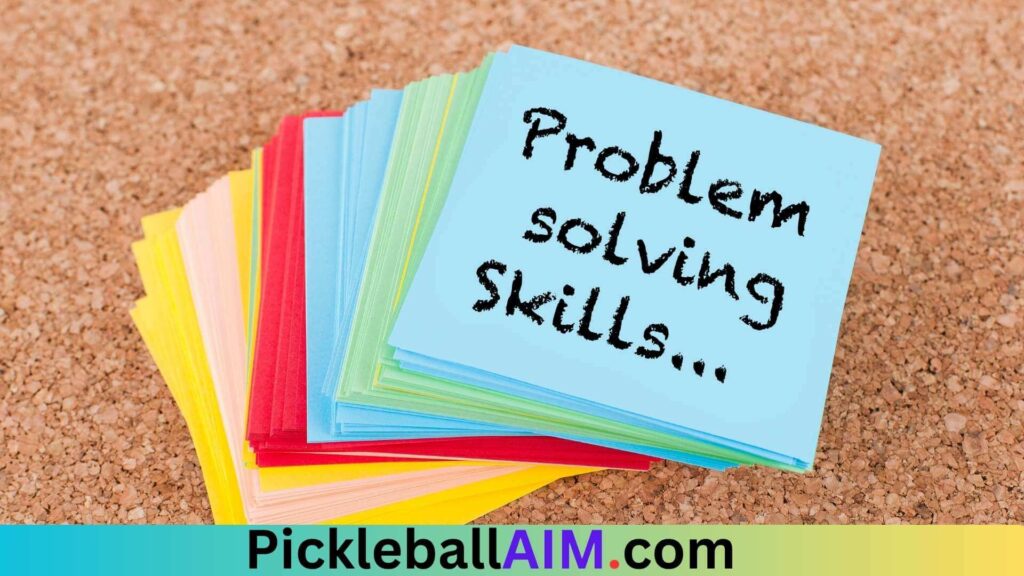
Pickleball: A Playground for Problem-Solving
Pickleball is not just a physical sport; it’s a playground for problem-solving. Every point requires players to strategize and make split-second decisions based on their opponent’s moves and court positioning. This constant cognitive challenge helps players develop their problem-solving skills in a dynamic and engaging environment.
Quick Thinking and Adaptive Strategies
In the heat of the game, players must quickly analyze situations and make strategic decisions to gain an advantage. Whether it’s figuring out the best shot to make in a given situation, anticipating an opponent’s next move, or adjusting your playing style to match the circumstances, pickleball demands adaptive problem-solving on the fly.
Transferring Problem-Solving Skills Beyond the Court
The problem-solving skills honed through pickleball have a positive ripple effect on other aspects of life. The ability to think critically, analyze situations, and make effective decisions translates into various real-world scenarios. Whether you’re navigating a complex issue at work, finding creative solutions to everyday challenges, or making important life choices, the problem-solving skills cultivated in pickleball will prove invaluable.
5. Reduced Cognitive Decline
The Aging Brain: A Concern for Cognitive Health
As we age, many individuals become concerned about the potential decline in cognitive function. Memory lapses3[For example, you might occasionally forget a person’s name, but recall it later in the day. You might misplace your glasses sometimes. Or maybe you need to make lists more often than in the past to remember appointments or tasks.], reduced focus, and slower processing speed are common age-related changes that can impact daily life. However, engaging in activities that combine physical exercise and mental stimulation, such as pickleball, can play a crucial role in reducing the risk of cognitive decline.
Pickleball: A Brain-Boosting Activity
Pickleball’s unique blend of physical activity and mental engagement offers a powerful defense against cognitive decline. Regular participation in this sport keeps the brain active, agile, and challenged, effectively slowing down age-related cognitive changes.
Physical Exercise and Brain Health
Numerous studies have demonstrated the positive impact of physical exercise on brain health. Regular physical activity, like pickleball, improves blood flow to the brain, increases the production of growth factors that support brain cells, and promotes the development of new neural connections. These benefits contribute to maintaining brain health and reducing the risk of cognitive decline.
Mental Stimulation and Cognitive Resilience
In addition to physical exercise, pickleball provides ample mental stimulation. The strategic thinking, quick decision-making, and problem-solving required on the court keep the brain engaged and active. This cognitive resilience acquired through pickleball can bolster the brain’s ability to adapt and cope with age-related changes.
6. Stress Reduction and Mood Enhancement
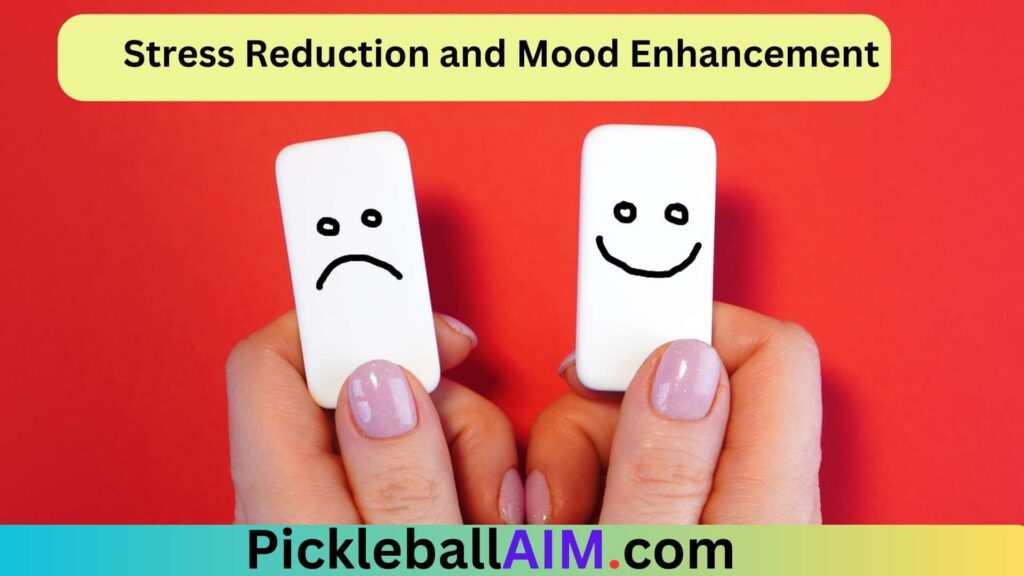
Pickleball: A Stress-Buster and Mood Elevator
Stress and anxiety can have detrimental effects on cognitive function, affecting memory, focus, and decision-making. Pickleball, being a social and enjoyable sport, offers an excellent outlet to relieve stress and elevate mood.
The Power of Social Interaction
Pickleball is often played in a social setting, providing players with opportunities to connect with others and forge meaningful relationships. Social interaction is essential for mental well-being, and the camaraderie on the pickleball court can act as a buffer against stress and anxiety.
Endorphins: Nature’s Mood Elevators
Engaging in regular pickleball sessions with friends boosts the production of endorphins in the brain. Endorphins are natural chemicals that act as mood elevators, promoting feelings of happiness and well-being. A positive mood not only enhances the overall quality of life but also benefits cognitive function, making you more alert and receptive to learning.
The Mind-Body Connection
The mind-body connection is powerful, and the physical activity in pickleball contributes to stress reduction. Exercise triggers the release of neurotransmitters that combat stress hormones, leading to a calmer and more relaxed state of mind.
Final Thoughts
Pickleball is more than just a recreational sport; it’s a fantastic way to enhance your cognitive function while having fun and staying physically active. Its ability to improve neuroplasticity, memory, focus, problem-solving skills4[Problem-solving is a complex skill. It involves critical thinking, decision-making, creativity, and information processing. Effective problem-solvers use a systematic approach that allows them to break down difficult problems into smaller, more manageable parts.], and mood makes it an excellent choice for individuals of all ages. So, if you’re looking for a sport that not only benefits your body but also boosts your brain, grab a paddle, find a pickleball court, and enjoy the mental and physical benefits this exciting sport has to offer.
Conclusion
Pickleball is not only a physically engaging sport but also a powerful tool for boosting cognitive function. From enhancing neuroplasticity and memory to sharpening focus, concentration, and problem-solving skills, the mental benefits of pickleball are numerous. Embrace the sport, challenge your brain, and enjoy the all-encompassing benefits of this exciting and social game. As you continue to play, you’ll find that the improvements in your cognitive abilities extend far beyond the pickleball court, enriching your life in countless ways. So, grab your paddle, hit the court, and embark on a journey to a healthier and more agile mind through the wonderful sport of pickleball.
